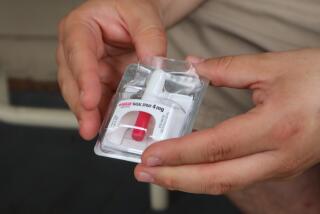O.C. to Study Canada Drugs
- Share via
An Orange County supervisor wants to consider allowing county employees to buy prescription drugs from Canada -- a practice prohibited by federal law -- to reduce healthcare costs.
Supervisor Chuck Smith said he will ask the board to study the potential cost savings and legal liability of allowing county workers to defy the Food and Drug Administration and buy drugs from Canada.
Many name-brand prescription drugs are cheaper in Canada because of its federal government’s price restrictions.
Smith’s idea comes as officials from Sacramento to Washington are debating whether the reduced costs to consumers outweigh the risks of importing medications.
The FDA says the practice violates federal law and places consumers at risk because drugs from Canada are not tested.
Last month, Sens. John McCain (R-Ariz.) and Edward M. Kennedy (D-Mass.) introduced a bill to allow Canadian pharmacies to export prescription drugs to the United States.
A handful of government entities across the nation currently allow employees to buy prescription drugs from Canada, over federal government objections.
Springfield, Mass., estimates it has saved more than $2 million in the 10 months after allowing its 20,000 employees, retirees and their dependants to buy drugs from Canadian pharmacies through the mail.
Minnesota last week announced that it would cover all costs for any of its 120,000 employees and dependants who agree to buy medication from Canada.
Successes like the Springfield program led Smith to wonder whether Orange County, with an estimated 30,000 employees, retirees and dependants, could also benefit.
“We’re going through the budget, and the healthcare costs are just astronomical,” Smith said. “Prescription costs are a big part of that.... We’re not asking [county staff] to do anything other than look into it. Part of that would be the legality and how much money we could save by doing it.”
Tom McGinnis, director of pharmacy affairs for the FDA, said Tuesday that Orange County would probably be breaking the law if it followed models set up in Springfield and Minnesota. The FDA has warned government entities -- including Springfield and Minnesota -- that it’s a crime to bring drugs into the United States that have not been tested -- and a crime to help others do that.
Orange County can expect similar resistance from the FDA.
“We’d be glad to talk to their attorneys and explain to them the parts of the federal law they’d be violating if they did a model like Springfield and some of the liability issues they might want to consider,” McGinnis said.
Despite the ban, the FDA informally allows individuals to order up to three months’ supply of medication from Canadian pharmacies, McGinnis said. The agency has sought court orders to prevent private U.S. groups from helping people import drugs from Canada, McGinnis said. “It’s commercial operations we have gone against, someone trying to facilitate the importation of illegal drugs and making money off of doing that,” he said.
Tom Wilson, chairman of the Orange County Board of Supervisors, said he was leery about his colleague’s proposal but might support a study of the idea. “It raises a lot of questions for me. When someone tells me it violates federal law I get concerned,” Wilson said. “I see the positive impacts [in] saving our seniors money. If we’re going to outsource to Canada, I don’t know what affect that would have on our pharmaceutical industry.”
The FDA position hasn’t curbed interest from other government entities. Local officials in Alabama, New York, North Carolina, Oregon, Vermont and Washington have set up similar plans for their government employees or are exploring them.
Today, the Los Angeles City Council is scheduled to decide whether to support federal legislation allowing the importation of prescription drugs from Canada. The council is also considering whether to help seniors access Canadian pharmacies.
“It potentially could save over $9 million per year.... That’s a large sum of money in any time, particularly now,” said former Springfield Mayor Michael Albano.
This month, attorneys general from 18 states -- including California Atty. Gen. Bill Lockyer -- suggested to Health and Human Services Secretary Tommy Thompson that he allow states to import drugs from Canada. Lockyer remains hopeful that the federal government will eventually open the border to drug importation.
“It’s a federal problem that requires a federal solution,” said Tom Dresslar, a Lockyer spokesman. “All these attempts [to buy drugs from Canada] reflect a frustration and unwillingness to pay the exorbitant prices companies charge for prescription drugs.
Times staff writer Patrick McGreevy contributed to this report.
More to Read
Sign up for Essential California
The most important California stories and recommendations in your inbox every morning.
You may occasionally receive promotional content from the Los Angeles Times.











